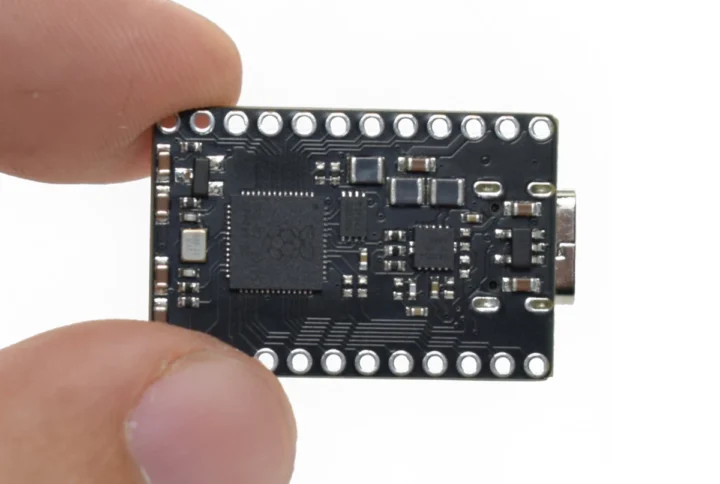Vcc Labs’ Nova is a tiny, open-source hardware Raspberry Pi RP2040 development board with a USB-C port, a 70 (7×10) addressable RGB LED matrix, and two 12-pin GPIO headers for expansion. It can be used for wearables, mini-displays, interactive art, fun games, and more.
Nova specifications:
- MCU – Raspberry Pi RP2040 dual-core Cortex-M0+ microcontroller @ up to 133 MHz with 264KB SRAM
- Storage – 2MB QSPI flash
- “Display” – 7×10 WS2812 addressable RGB LEDs, each measuring just 1x1mm
- USB – USB Type-C port for power, data, and programming
- Expansion – 2x 12-pin header with 20x GPIO, 2x SPI, 2x I2C, 2x UART, 4x ADC, Vin, 5V, 3.3V, and GND
- Misc – Reset and BOOT buttons
- Power Supply
- 5V via USB-C port
- 7V to 18V via Vin pin
- Power consumption – 9 Watts with all LEDs at full brightness
- Dimensions – 30.48 x 20.32 mm (PCB only)
- Weight – 4.76 grams with headers, 3 grams without headers
- Temperature Range – -20 to +85°C

The Nova can be programmed with the official Raspberry Pi C/C++ or MicroPython SDK, or as an Arduino development board. Some code samples or more exactly five games: Ball Brick, Flappy Bird, Snake, Space Invaders, and Tetris are provided on GitHub. You just need to connect five buttons to GPIO pins 2-6 to play the games. You’ll also find a Hardware directory there, but it only includes the BoM and board dimensions files. Since it’s an open-source hardware project, the schematics and design files will eventually be released, likely right after the crowdfunding campaign is finished.
It’s not the first time we have written about an MCU board with an RGB LED matrix, and some examples include 01Space’s ESP32-based 25 RGB LED matrix boards and the Waveshare ESP32-S3-Matrix board equipped with 64 RGB LEDs. The Nova has a few more LEDs and features an RP2040 MCU without wireless connectivity.
Vcc Labs launched the Nova on Kickstarter with a 3,000 Euros funding target. Rewards start at 18 Euros/$20 US for a single board, but we can get it cheaper per unit by pledging for bundles of up to 10 boards. The shipping fee varies a lot from 3 Euros to 48 Euros depending on the destination country. Backers should get their rewards shipped by January 2025.

Jean-Luc started CNX Software in 2010 as a part-time endeavor, before quitting his job as a software engineering manager, and starting to write daily news, and reviews full time later in 2011.
Support CNX Software! Donate via cryptocurrencies, become a Patron on Patreon, or purchase goods on Amazon or Aliexpress





